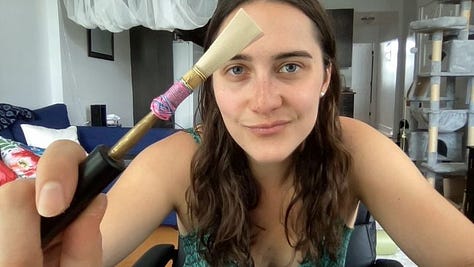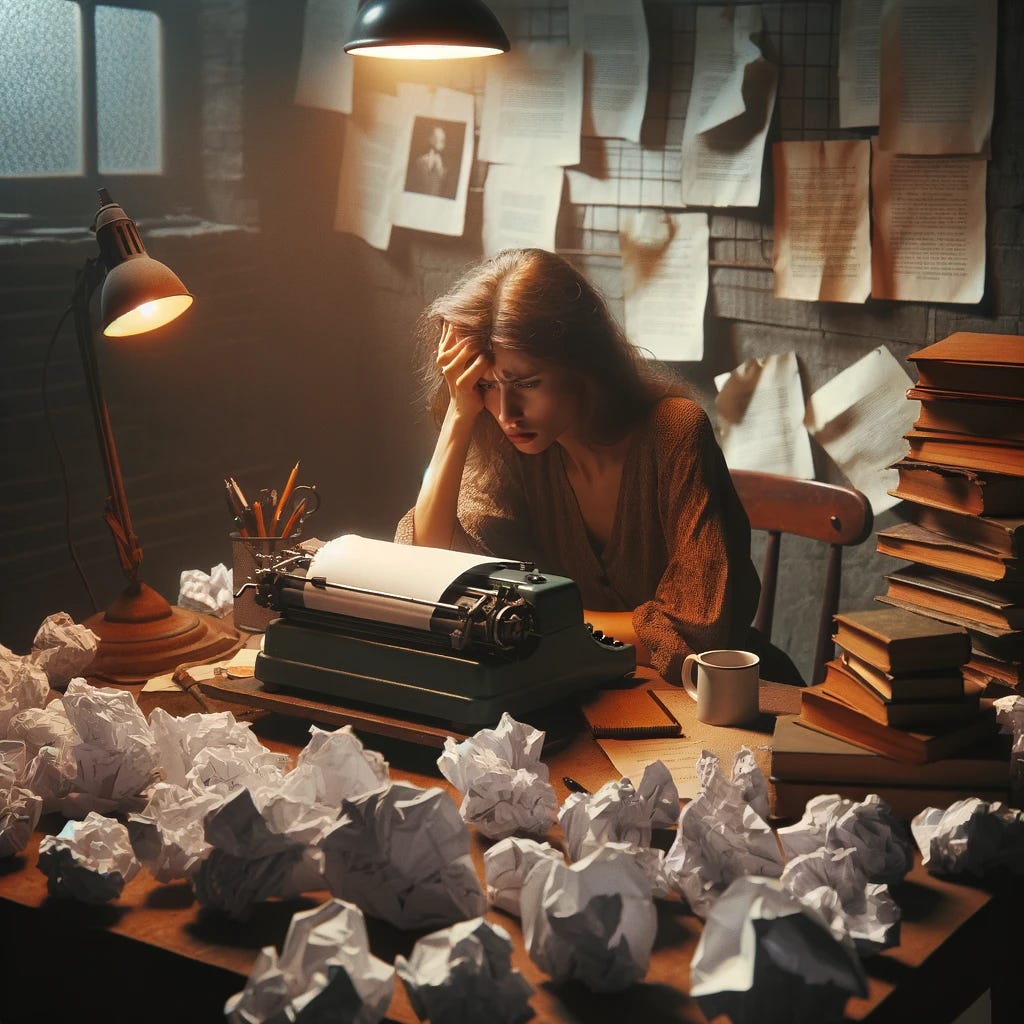This title is imperfect but so is art: redefining (im)perfection as an artist
Overcoming creative blocks, performance anxiety, and the pressure of perfectionism
Let me introduce myself…
I’m Cierra, a freelance copywriter by day, English literature grad student by night, and passionate orchestra musician somewhere in between (oh, and I’ve also got a bachelor’s degree in neuroscience…the mind is just so fascinating!). I pretty much spend my days reading, writing, thinking, and creating, except for when I’m out exploring nature or busy laughing at myself. But that’s enough about me, let’s get to the good stuff!
Find my work here.
Have you ever sat down to write something… only to find that the words just suddenly won’t come? Or that the right words won’t come? I think we’ve all experienced such writer’s block, whether we consider ourself a bona-fide writer or not.
For me, it most frequently strikes at the very beginning of a new project. Even worse, the more important or high stakes the piece I need to write, the harder I find it to lasso in my thoughts and control them.
But I find the term “writer’s block”, which is often understood as the inability to come up with new ideas and content, to be a bit misleading in some instances.
It’s not always a lack of ideas or thoughts causing the hold-up. Sometimes, I’m instead struggling to translate the sprawling chaos of (somehow related) thoughts and ideas floating about in my mind into a clear and coherent flow of words on the page.
In these instances, it’s not a lack of ideas that is the problem but the lack of organization of my ideas. The end result is the same – failure to produce any creative work – but the mechanism by which I’ve arrived there is fundamentally different.
I call this distinct phenomenon thinker’s block (but arguably, it could be considered as a type of writer’s block). It’s a bit different from traditional writer’s block because the ideas are already there – in fact, that’s the very issue!
There are simply too many ideas swirling about at once; you know you can link them all together, but how do you do so in a way that doesn’t miss anything. How do you present them in the very best way possible? How do you convey everything perfectly – and do so right from the start?
Thus, we’ve arrived at the ugly heart giving life to my thinker’s block: perfectionism.
In creative pursuits, the strive for (unattainable) perfectionism can be equally as motivating as it can be debilitating. Success is often achieved on account of that dogged persistence to be the best.
However, if we’re not careful, this gotta be perfect attitude can quickly become our own worst enemy, leaving us stuck at the drawing board or crumbling from the pressure when it matters most.
Yep, performance anxiety, or “choking”, is simply another manifestation of the same problem, an unhealthy attachment to perfectionism.
Although perfectionism tends to pop up as an unwanted visitor during my writing sessions, I’ve only ever felt helplessly trapped under its cruel spell as a musician, a classically trained musician, to be specific.
Since grade three, I’ve been playing musical instruments in bands and orchestras. I’ve always loved performing in group ensembles, especially on bassoon, my main instrument. But ask me to play solo in front of literally any other person, and poof! It was as if I’d never touched an instrument before.
My musical performance anxiety was quite the conundrum – when it came to public speaking, I was calm, cool, and collected. Similarly, I loved acting on stage. The more front and center the role, the better.
What was different about music?
I spent years trying to unravel the mystery, constantly engaged in the process of self-questioning, self-reflecting, and analyzing my own mindset.
Why was I so afraid of messing up? Ashamed of (possibly) making a mistake?
Finally, in my second year of university, the revelation came: I was scared that people would judge me as less if I messed up when performing. Not judge my playing as less, but judge me, Cierra, as less.
I had fallen into the fallacy that my identity was the art I created; the judging of my art was thus the same as the judging of me.
This kind of thinking, however, completely disregards any sort of nuanced distinction between art and artist – and there is indeed a separation.
For while we might consider art to be inseparable from its artist, the artist exists as a complex human being embedded within social, cognitive, and environment networks, of which their art can only be but a small part.
Put another way: the artist is not their art (whether or not we believe the art is reducible to the artist).
It was my first big break-through. How I performed as Cierra the bassoonist, Cierra the musical artist, did not change my worth as Cierra the person.
Sure, it sounds quite obvious when I put it like that, but it’s all too easy for creatives to blur the line between art and artist, inadvertently allowing (im)perfection to bleed through the overlap.
When we, as artists, slip into the trap of perfectionism, we run the risk of conflating the imperfectness of our art with such an imperfectness in our identity.
In doing so, it becomes all too easy to consider our own value as therefore not-quite-good-enough, as somehow lacking, as deficient – and this insecurity then becomes a self-fulfilling prophecy when we fail to create new (perfect) art.
After all, if we must produce perfect art to be worthy as a person, is it any wonder that we find ourselves paralyzed by pressure before we even begin?
Crucially, though, when we shift our mindset, the ideal of (im)perfection transforms from something destructive into a powerful and affirming force, one that ultimately leads us to re-envision both art and artist as valuable because of their imperfections.
What makes art perfect? Can art ever be truly perfect given its subjective nature?
The turning point in my journey as a performance-anxiety-crippled musician was coming to the realization that there is no single definition of perfection when it comes to art. Be it music, writing, or some other form of creative expression, it’s essentially up to me to decide.
In my view, the beauty of art lies in its ability to capture, convey, and engage with the human experience, both in terms of its creation and reception – and what’s the human experience without imperfection?
To be human is to be imperfect, but that doesn’t diminish the beauty. The same, too, is true of art.
Gradually, instead of viewing the mistakes I made while playing bassoon as failures, I began to consider them as evidence of the human passion and soulful expression being put into my music.
Just like my phrasing, articulation, and dynamic choices, my imperfections were part of the special touches that made my art uniquely mine and uniquely human.
And wouldn’t you know it, since adopting this new mindset, my performance anxiety has practically all but disappeared.
As soon as we decide to embrace the beauty of imperfection, we open the door for creativity to flourish once more, be it at the start, final execution, or anywhere along the journey of our artistic endeavors.
So, just imagine what might happen if you, too, chose to embrace imperfection in your art instead of fearing it.



Check out Cierra’s contributor bio, and encourage her by leaving a like and a comment!
This is a publication that prides itself on celebrating the creative community. Creatives across all mediums share universal experiences, so by welcoming authentic voices, we hope to create a sense of community for all artists. We wish to make the experience of living the artist’s life a little less solitary.
Click here to view our plans for future events and what you can get for referring friends!
Do you have a story to tell? Consider pitching to us! Email byteyourexpression@gmail.com with “Pitch” as the subject heading.
You would be given complete creative freedom (written, or audio/visual). As long as you have a focus on providing:
inspiration
education
motivation
comfort
(or anything in between)
For the creative community, it’s fair game!
We are thrilled to have you here and hope to see you again soon.






Love this article Cierra!
Yes, we should embrace imperfectionism. We need the freedom to express ourselves, without the pressures. Otherwise we may just get stuck and not do the thing! That is a very affirming piece. <3